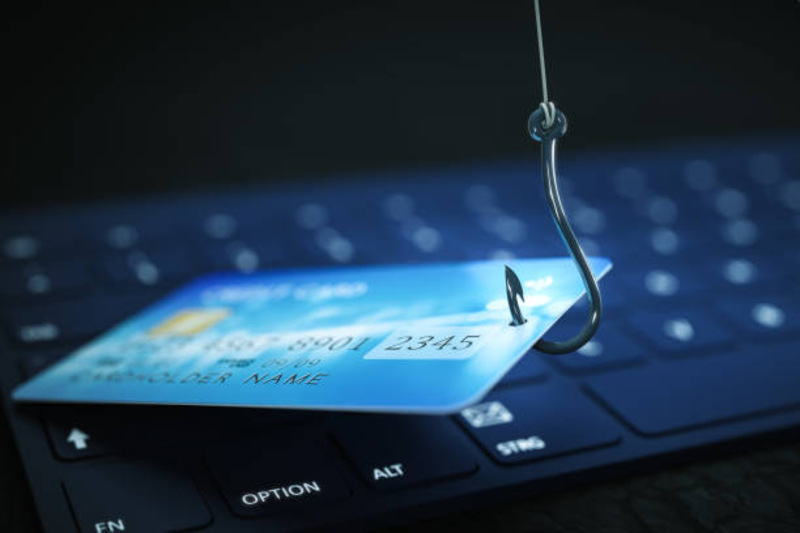Your Credit Card Was Hacked: Immediate Steps to Take
Nov 30, 2023 By Susan Kelly
In today's interconnected world, the prevalence of online transactions has made our lives more convenient but has also exposed us to the risk of cyber threats. One such threat is credit card hacking, a situation that can be unnerving and unsettling. If you've fallen victim to credit card fraud, it's crucial to act swiftly and decisively to minimize potential damage. In this article, we'll guide you through the immediate steps you should take to address the situation and safeguard your financial well-being.
Stay Calm and Confirm the Breach:
The first and foremost step is to remain calm. Take a deep breath and confirm that your credit card has indeed been compromised. Check your recent transactions online or contact your bank's customer service for confirmation.
Contact Your Bank Immediately:
As soon as you confirm the unauthorized activity, contact your bank or credit card issuer without delay. Most financial institutions have a 24/7 helpline for reporting such incidents. Provide them with details of the suspicious transactions and follow their instructions.
Freeze Your Card:
Request your bank to freeze or block your credit card to prevent any further unauthorized transactions. This immediate action helps limit the potential damage and protects your remaining funds.
Change Passwords and Enable Two-Factor Authentication:
In many cases, credit card information is compromised through online accounts. Change the passwords for your online banking, email, and any other accounts linked to your credit card. Enable two-factor authentication wherever possible to add an extra layer of security.
Review and Document:
Thoroughly review your recent statements and transactions. Document all unauthorized activities, noting the date, time, and amount of each suspicious transaction. This information will be valuable when working with your bank and reporting the incident to law enforcement.
File a Police Report:
Depending on your jurisdiction, filing a police report may be necessary. Provide the documented evidence of the unauthorized transactions to law enforcement, as it can aid in investigations and increase the chances of apprehending the culprits.
Check Credit Reports:
Monitor your credit reports for any unusual activities. Some credit card hacks may lead to identity theft, and checking your credit reports regularly can help you identify any new accounts opened fraudulently in your name.
Stay Informed:
Keep yourself updated on the progress of the investigation. Your bank may provide updates on the resolution process, and staying informed will help ease your concerns.
Educate Yourself:
Take this unfortunate incident as an opportunity to educate yourself about online security best practices. Be cautious about sharing personal information online and regularly update your passwords.
Consider Credit Monitoring Services:
To add an extra layer of protection, consider subscribing to credit monitoring services. These services can alert you to any suspicious activities related to your credit report.
Inform Merchants and Subscription Services:
If any unauthorized transactions were made with specific merchants or subscription services, contact them directly. Informing them of the fraudulent activity can help prevent further charges and aid in their internal investigations.
Update Contact Information:
Ensure that your bank and other relevant accounts have your current contact information. This is crucial for receiving updates on the resolution process and any potential follow-up actions.
Be Wary of Phishing Attempts:
Fraudsters may attempt to exploit the situation through phishing emails or calls. Be cautious of unsolicited communications claiming to be from your bank or other financial institutions. Always verify the legitimacy of the communication before providing any information.
Understand Your Liability:
Familiarize yourself with your credit card's terms and conditions regarding liability for unauthorized transactions. In many cases, if you report the incident promptly, your liability may be limited, and you may be eligible for a full refund.
Consider a Credit Freeze:
If you suspect a broader threat to your identity, consider placing a credit freeze on your accounts. This adds an extra layer of security by restricting access to your credit report, making it more challenging for fraudsters to open new accounts in your name.
Seek Legal Advice if Necessary:
In cases of severe financial and emotional distress, it may be beneficial to seek legal advice. A legal professional can guide you on potential actions, rights, and responsibilities, ensuring that you take the appropriate steps to protect yourself.
Monitor Other Financial Accounts:
While your immediate concern may be your credit card, don't overlook your other financial accounts. Regularly monitor your bank accounts, savings accounts, and investment portfolios for any suspicious activities.
Learn from the Incident:
Use this unfortunate incident as a learning opportunity. Reflect on how the breach occurred and what additional security measures you can implement in the future. Understanding the modus operandi of cybercriminals can empower you to better protect yourself.
Report to Consumer Protection Agencies:

In some regions, consumer protection agencies handle cases of financial fraud. Report the incident to these agencies, providing all necessary documentation. This not only contributes to ongoing investigations but also helps create awareness about emerging threats.
Stay Proactive with Security Updates:
Stay informed about security updates and patches for your devices and software. Regularly update your antivirus and anti-malware programs to ensure that your digital environment is as secure as possible.
Utilize Identity Theft Protection Services:
Consider enrolling in identity theft protection services that offer continuous monitoring of your personal information. These services can provide alerts for potential identity theft and offer assistance in resolving issues related to compromised personal data.
Update Social Media Privacy Settings:
Review and adjust your privacy settings on social media platforms. Cybercriminals often gather information from social media to carry out targeted attacks. Minimize the amount of personal information visible to the public and be cautious about accepting friend requests from unknown individuals.
Inform Credit Bureaus:
Contact the major credit bureaus – Equifax, Experian, and TransUnion – to report the credit card hack. Placing a fraud alert on your credit reports can provide an additional layer of protection, making it more challenging for identity thieves to open new accounts in your name.
Evaluate Your Online Habits:
Take a critical look at your online habits and identify potential vulnerabilities. Avoid using public computers for sensitive transactions, be cautious about clicking on unfamiliar links, and use secure, unique passwords for each of your online accounts.
Communicate with Law Enforcement:

If you filed a police report earlier, maintain open communication with law enforcement authorities. Provide any additional information they may require during the investigation. Collaboration with law enforcement increases the chances of apprehending the perpetrators.
Review Insurance Coverage:
Check your insurance policies to see if they cover losses resulting from identity theft or credit card fraud. Some insurance plans offer coverage for expenses related to recovering your identity and resolving issues arising from financial fraud.
Conclusion:
Experiencing credit card fraud is undoubtedly distressing, but taking immediate and decisive action can mitigate potential damage. By staying calm, contacting your bank promptly, and following the recommended steps, you can reclaim control over your financial security. Remember, vigilance and proactive measures are key to safeguarding your personal and financial information in the digital age.
On this page
Stay Calm and Confirm the Breach: Contact Your Bank Immediately: Freeze Your Card: Change Passwords and Enable Two-Factor Authentication: Review and Document: File a Police Report: Check Credit Reports: Stay Informed: Educate Yourself: Consider Credit Monitoring Services: Inform Merchants and Subscription Services: Update Contact Information: Be Wary of Phishing Attempts: Understand Your Liability: Consider a Credit Freeze: Seek Legal Advice if Necessary: Monitor Other Financial Accounts: Learn from the Incident: Report to Consumer Protection Agencies: Stay Proactive with Security Updates: Utilize Identity Theft Protection Services: Update Social Media Privacy Settings: Inform Credit Bureaus: Evaluate Your Online Habits: Communicate with Law Enforcement: Review Insurance Coverage: Conclusion:
What is Active Income and How Does It Differ from Passive Income?
By Susan Kelly / May 18, 2024
Discover the ins and outs of active and passive income. Get insights, examples, and comparisons to help you manage your finances effectively.

Unearthing and Rectifying Credit Report Blunders
By Triston Martin / Nov 30, 2023
Dive into this article to learn how to identify and fix mistakes on your credit report. Discover the steps to improve your credit score and financial health.

Ways Marginal Revenue Related Marginal Cost Production
By Susan Kelly / Feb 11, 2024
Marginal cost of production and the marginal revenue are economic metrics that are used to calculate the quantity of output and the price per unit of a product that will result in the greatest amount of profits.

How And Where to Invest in the Dow Jones Industrial Average
By Triston Martin / Oct 17, 2023
The DJIA is one of the most widely followed stock market indices and is calculated as the weighted average price of 30 major, well-known companies. The Dow Jones Industrial Average (DJIA) is not a security that can be bought and sold on its own; instead, investors must purchase other investment vehicles that follow the DJIA or its components to have exposure to its performance. Investing in the Dow Jones Industrial Average (DJIA) may be done in several ways, including purchasing shares of the 30 firms that make up the index, purchasing index funds or ETFs that follow the index, or purchasing the "Dogs of the Dow," the Ten highest-yielding equities on the DJIA.

What Makes a Chartered Insurance Professional? A Deep Dive into CIP
By Triston Martin / May 20, 2024
Explore the benefits of the CIP designation for insurance professionals, covering exams, career advancement, and industry recognition.

Understanding Commercial Construction Loans and How to Secure One
By Susan Kelly / Jan 27, 2024
Explore the different types of commercial construction loans, understand the application process and learn key steps to secure construction financing for your business project.

SR-22 Insurance: Definition and Working in Detail
By Triston Martin / May 12, 2024
An SR 22 Insurance Missouri indicates you have the necessary insurance coverage. It helps restore driving privileges or license suspension.

Best Alternatives to Fidelity 2024 to Invest Your Money
By Triston Martin / May 11, 2024
Discover the best alternatives to Fidelity for your investment needs. Compare features and performance to make informed decisions.

Your Credit Card Was Hacked: Immediate Steps to Take
By Susan Kelly / Nov 30, 2023
This guide provides a comprehensive approach to dealing with credit card fraud. It offers a series of well-structured, practical steps to help victims mitigate the damage and safeguard their personal and financial information in the future.

Participating In Extracurricular Activities After Retirement
By Susan Kelly / Nov 04, 2023
You don't simply stop doing anything when you retire. There are fewer things to do that will challenge your brain and body. The good news is that plenty of pleasurable and worthwhile pursuits remain to be had even after retirement. You may no longer have time to converse with coworkers as you stroll from the train station to the workplace or break room

Demystifying the Annual Insurance Review: Your Simple Guide to Ensure Adequate Coverage
By Triston Martin / Nov 25, 2023
Unlock the secrets of an effective annual insurance review with our simplified guide. Learn to navigate your insurance policy, make informed decisions, and ensure your coverage meets your needs.

Maximize Your Rewards with the Capital One MLB Credit Card
By Triston Martin / Nov 23, 2023
Explore how to maximize rewards with the Capital One MLB Credit Card. Learn strategies for tracking spending, redeeming points, and leveraging exclusive offers.